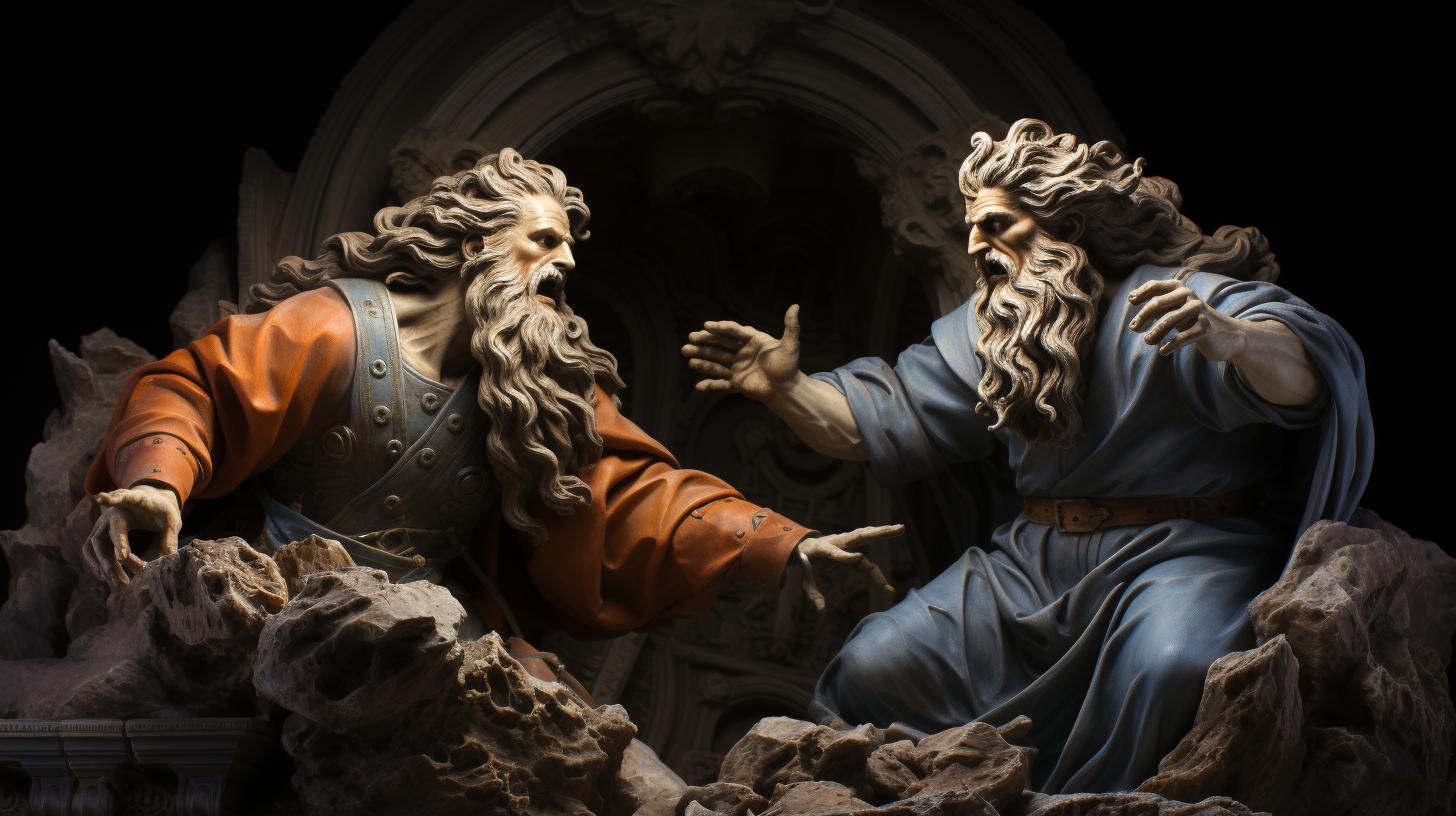Doris: The Greek Goddess of the Sea and Abundance

Doris, the Greek goddess associated with the sea and water, holds a significant role in Greek mythology. Born to Oceanus and Tethys, she is married to Nereo and is the mother of fifty daughters, known as the Nereids.
Doris is revered as a kind ruler of the sea, providing abundant food and shelter for marine creatures. Her ability to create fertile grounds where freshwater mixes with saltwater makes these areas ideal for fishing.
Doris is mentioned in ancient texts like Hesiod’s Theogony and Pseudo-Apollodorus’ Library, and her influence extends to modern worship and celebrations, such as the Jubilee in Mobile Bay, Alabama. The goddess continues to be studied and interpreted by experts like Patricia Monaghan, shedding light on her connections to the Dorians.
Mythological Origins and Family of Doris
The origins of Doris, the Greek goddess associated with the sea and water, can be traced back to her parents, Oceanus and Tethys. As the daughter of these powerful deities, Doris inherits her connection to the vastness of the ocean and its depths.
Oceanus and Tethys: Parents of Doris
Oceanus, often referred to as the god of the river that encircles the Earth, and his wife Tethys, a sea goddess, are the proud parents of Doris. This esteemed lineage highlights Doris’ divine nature and her deep association with the sea.
Marriage to Nereo: The Husband of Doris
Doris finds love and companionship in her marriage to Nereo, a sea god who shares her affinity for the water. Their union solidifies Doris’ position as a powerful force in the realm of the sea and underscores her influence as a guardian of marine life.
Motherhood: Doris and Her Fifty Daughters, the Nereids
As a mother, Doris gives life to fifty daughters known as the Nereids. Ploto, Eucrante, Anfitrite, and Tetis are just a few of the notable Nereids who play important roles alongside Doris in caring for the young beings on land.
This vast family portrays Doris’ nurturing nature and her role in ensuring the well-being of both sea and land creatures.
Doris as a Ruler of the Sea
Doris, the Greek goddess, holds a significant role as the ruler of the sea. Her influence extends to providing food and shelter for various marine creatures, ensuring their well-being in her watery domain.
Role in Providing Food and Habitat for Marine Creatures
Doris, with her nurturing nature, takes on the responsibility of ensuring the abundance of food and suitable habitats for the diverse array of marine creatures that dwell in her realm.
She works diligently to create and maintain an environment conducive to their survival and prosperity.
With her profound power, Doris orchestrates the delicate balance between the salty and fresh waters, allowing the perfect conditions for marine life to thrive. This harmonious fusion of elements results in fertile grounds that abound with plentiful resources, including an abundant food supply and an optimal ecosystem for various species to flourish.
Fertility and Fishing: Doris’ Creation of Fertile Grounds
Doris possesses a unique ability to merge the realms of saltwater and freshwater, leading to the creation of rich and fertile grounds in the coastal areas. These areas, where freshwater mixes with the sea, become ideal fishing grounds, attracting fishermen and providing sustenance for coastal communities.
Through this harmonious blending, Doris ensures the continuous supply of fish and other aquatic resources, contributing to the prosperity of communities that rely on the bounties of the sea.
Her connection to fertility extends beyond the marine realm, as her creation of fertile grounds also influences agricultural productivity along the coastlines.
Doris’ role as a ruler of the sea encompasses not only the provision of food and habitats but also the preservation of the delicate balance that sustains marine life.
Through her efforts, she maintains a harmonious ecosystem where both marine creatures and coastal communities can thrive.
Doris’ Influence and Worship
Doris, the Greek goddess associated with the sea and water, holds significant influence and is a subject of worship in various cultures. Her role as a nurturer and provider for marine life has earned her reverence and celebration in different traditions.
Doris’ Jubilee in Mobile Bay, Alabama
In Mobile Bay, Alabama, a unique event called Doris’ Jubilee takes place to honor the abundance provided by the goddess. This celebration occurs when fish are trapped near the shore due to a lack of oxygen in the water.
Participants gather to collect the stranded fish, perceiving it as Doris’ provision. It is customary to prepare a feast with the collected fish and express gratitude to Doris for her generosity.
Amulets and Offerings: Celebrating and Honoring Doris
To show devotion and seek blessings from Doris, worshippers partake in the creation of amulets and offer various offerings. One popular practice involves submerging seashells or oceanic stones in seawater during a waxing crescent moon for three hours.
The resulting amulet is believed to attract abundance and wealth, symbolizing Doris’ benevolence. Worshippers also present offerings, such as flowers or symbolic items, as a gesture of reverence and to seek her favor.
Through the celebration of Doris’ Jubilee and the creation of amulets and offerings, worshippers express their gratitude for her providence and seek her continued blessings in their lives.
Doris in Ancient Texts and Modern Interpretations
As a prominent figure in Greek mythology, Doris’s presence is recorded in various ancient texts, including Hesiod’s Theogony and Pseudo-Apollodorus’ Library, which offer insights into her role and significance.
These accounts provide a deeper understanding of Doris as a goddess of the sea and her influence on the lives of both mortals and other deities.
Doris’ Mention in Hesiod’s Theogony and Pseudo-Apollodorus’ Library
In Hesiod’s Theogony, Doris is acknowledged as the daughter of Oceanus and Tethys, and the wife of Nereo.
Her role as the mother of the Nereids, including Tetis and Anfitrite, is also emphasized. The text explores her benevolence and protective nature, highlighting her responsibility in caring for the young beings on Earth.
In addition, Doris is mentioned in Pseudo-Apollodorus’ Library, further solidifying her importance in Greek mythology. This text expands on her role as a go-between figure, linking the sea and the land.
It sheds light on her ability to create fertile environments where fresh and saltwater meet, making these areas ideal for fishing and sustaining life.
Patricia Monaghan’s Insights on Doris and her Connection to the Dorians
Renowned scholar Patricia Monaghan has conducted extensive research on ancient goddesses, including Doris.
Drawing from her expertise, Monaghan suggests that Doris may have been an ancient deity worshipped by the Dorians, a Greek population group. Through her analysis, she highlights the potential ancestral connections between Doris and the Dorians, shedding light on the cultural and religious significance of this goddess.
Monaghan’s insights provide valuable perspectives on Doris’ role beyond the myths and offer a glimpse into how the goddess was perceived during ancient times. Her research enhances our understanding of Doris’ cultural importance and reinforces her status as a revered and influential figure in Greek mythology.
.




















